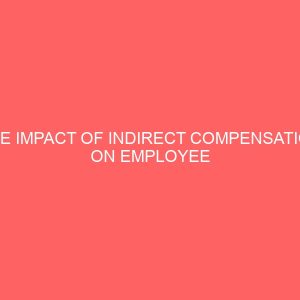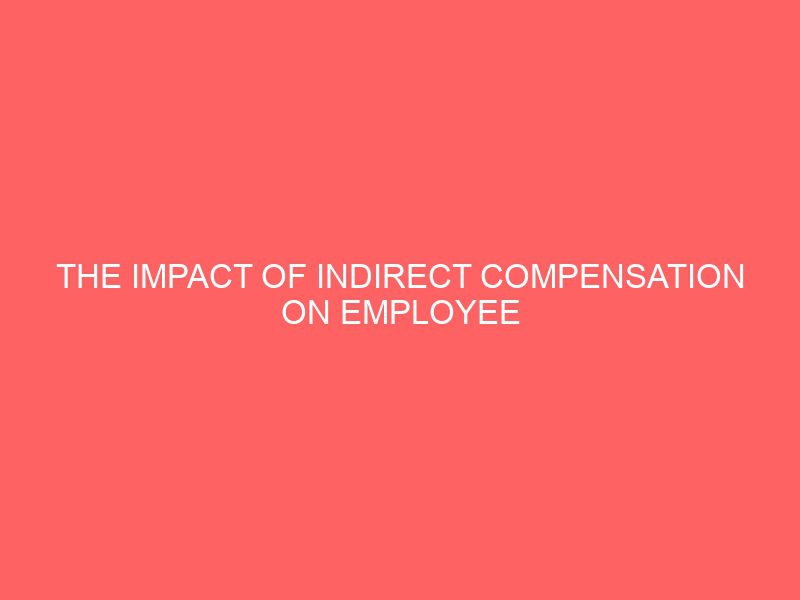Description
ABSTRACT
The subject of Compensation and for that matter Indirect Compensation is of immense importance since its impact affects the well being of the individuals in the organizations concerned. It is an important component of Administration and plays a significant role in creating a stable industrial environment, a condition which is vital to national development and economic growth. This study examines the issue of Indirect Compensation by studying a reputable institution, that is, Central University College, which has not experienced any labour unrest so far. It focuses in particular, on the impact of indirect compensation on employee productivity. The study has been accomplished through the use of questionnaires, interviews, administrative and conditions of service manual of Central University College and other sources such as journals, internet resources and text books on management. It was uncovered that though Management implements some of the indirect compensations available, there are other benefits which are not satisfactorily administered and this has contributed to a lack of zeal towards work, which has affected the productivity of staff negatively. The study therefore recommends that Management of Central University College and other organizations should provide the necessary attention that Indirect Compensation deserves, as this will help boost the morale of employees which will in turn result in higher productivity.
CHAPTER ONE
INTRODUCTION
1.1 BACKGROUND TO THE STUDY
Compensation is an important issue which needs to be addressed because it directly or indirectly affects profitability and competitiveness of an organization as well as the well being of employees. It has a major impact on employees standards of living and communicates to them the degree to which the employer values their contribution. It is an important tool for employers in influencing employee attitudes such as perceptions of fairness and employee behaviour including whether an employee is attracted to and remains with the employer and how effective the employees use their time at work. The compensation package is normally differentiated into Direct and Indirect Compensation. These comprise financial and nonfinancial rewards. Noe et al, 1996.
In preindustrial society where economic relation was one of master and slave, or craftsman and apprentice, the role and position of a labourer was prescribed by custom of law. With few exceptions, economic units expanded and working relation became increasingly depersonalized. Later, more legalistic and contractual attitude toward employment was established to cater for the welfare of the individual worker. It was at this time that theories like Marginal Productivity and Compensation cropped up or were put forward to explain the reward that is due to labour. The reward an employee received for his labour was then seen as the payment of a wage or salary for each unit of time spent on a job. With increasing industrialization, rising income and trade unionism, the reward of employees has widened to include fringebenefits. The basic salary or wage and fringe benefits are seen as contractual elements of remuneration that an employer provides for employees. This suggests that, there is always a contract between the employer and employee. The employer always has something to offer which the employee agrees to accept. Between the offer and acceptance, considerations are made such as the employers ability to provide the remuneration, the employees mandate to negotiate and the external governmental policies. A documented contract along these lines therefore becomes a formal Conditions of Service which contains the indirect compensation or fringe benefits.
1.2 STATEMENT OF THE PROBLEM
It is sometimes assumed that there is no positive relationship between indirect compensation and employee productivity, or that if there is at all, it is insignificant. However, in organizations where employees are content with their fringe benefit packages there seem to be high performance because employees know that when they increase their productivity they will be well compensated. This study is motivated by the spate of complaints by some workers in Central University College about the unsatisfactory indirect compensation packages. They are often of the opinion that the effort they put in their work is not commensurate with the indirect compensation they receive and they therefore are not motivated to work hard. In CUC, some workers have opined that they would prefer certain benefits to what they are being offered and therefore should be given the opportunity to make choices or management should augment the benefits available. Some employees also appear not to be aware of what the Administrative and Conditions of Service manual of the University contains. Since employees most times agitate for better fringe benefit packages a number of problems have been arising, some of which are individual disputes to register their dissatisfaction, low productivity, and low morale.








Reviews
There are no reviews yet.